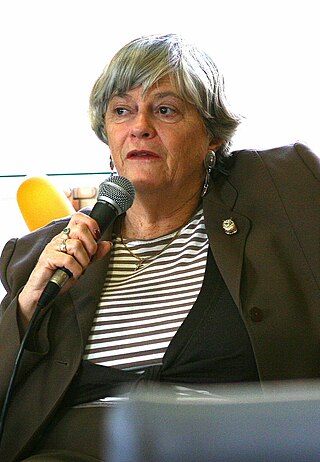
Ann Noreen Widdecombe is a British politician, author and television personality. She was Member of Parliament (MP) for Maidstone and The Weald, and the former Maidstone constituency, from 1987 to 2010 and Member of the European Parliament (MEP) for South West England from 2019 to 2020. Originally a member of the Conservative Party, she was a member of the Brexit Party from 2019 until it was renamed Reform UK in 2021.

Existentialism is a form of philosophical inquiry that explores the issue of human existence. Existentialist philosophers explore questions related to the meaning, purpose, and value of human existence. Common concepts in existentialist thought include existential crisis, dread, and anxiety in the face of an absurd world, as well as authenticity, courage, and virtue.
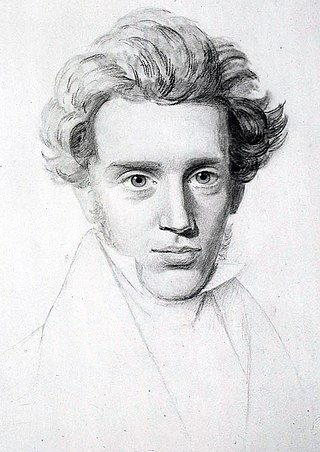
Søren Aabye Kierkegaard was a Danish theologian, philosopher, poet, social critic, and religious author who is widely considered to be the first existentialist philosopher. He wrote critical texts on organized religion, Christianity, morality, ethics, psychology, and the philosophy of religion, displaying a fondness for metaphor, irony, and parables. Much of his philosophical work deals with the issues of how one lives as a "single individual", giving priority to concrete human reality over abstract thinking and highlighting the importance of personal choice and commitment. He was against literary critics who defined idealist intellectuals and philosophers of his time, and thought that Swedenborg, Hegel, Fichte, Schelling, Schlegel, and Hans Christian Andersen were all "understood" far too quickly by "scholars".

Emmanuel Levinas was a French philosopher of Lithuanian Jewish ancestry who is known for his work within Jewish philosophy, existentialism, and phenomenology, focusing on the relationship of ethics to metaphysics and ontology.
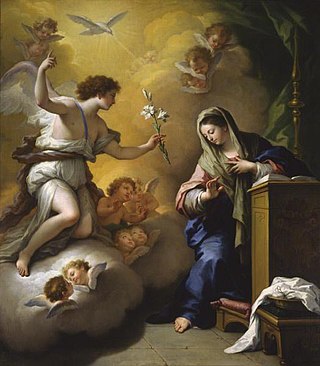
Archangels are the second lowest rank of angel in the hierarchy of angels. The word "archangel" itself is usually associated with the Abrahamic religions, but beings that are very similar to archangels are found in a number of other religious traditions.
In Mormonism, the restoration refers to a return of the authentic priesthood power, spiritual gifts, ordinances, living prophets and revelation of the primitive Church of Christ after a long period of apostasy. While in some contexts the term may also refer to the early history of Mormonism, in other contexts the term is used in a way to include the time that has elapsed from the church's earliest beginnings until the present day. Especially in the Church of Jesus Christ of Latter-day Saints "the restoration" is often used also as a term to encompass the corpus of religious messages from its general leaders down to the present.
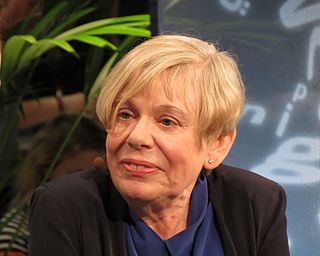
Karen Armstrong is a British author and commentator of Irish Catholic descent known for her books on comparative religion. A former Roman Catholic religious sister, she went from a conservative to a more liberal and mystical Christian faith. She attended St Anne's College, Oxford, while in the convent and majored in English. She left the convent in 1969. Her work focuses on commonalities of the major religions, such as the importance of compassion and the Golden Rule.
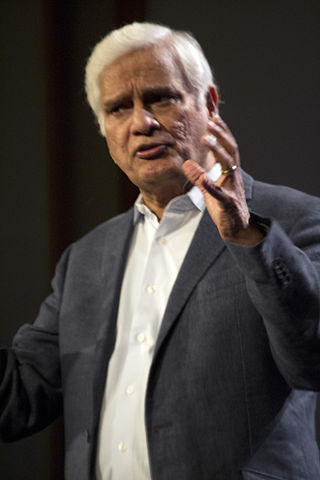
Frederick Antony Ravi Kumar Zacharias was an Indian-born Canadian-American Christian evangelical minister and apologist who founded Ravi Zacharias International Ministries (RZIM). He was involved in Christian apologetics for a period spanning more than forty years. Zacharias was the author of more than thirty books on Christianity, He also hosted the radio programs Let My People Think and Just Thinking. He belonged to the Christian and Missionary Alliance, the Keswickian Christian denomination in which he was ordained as a minister.
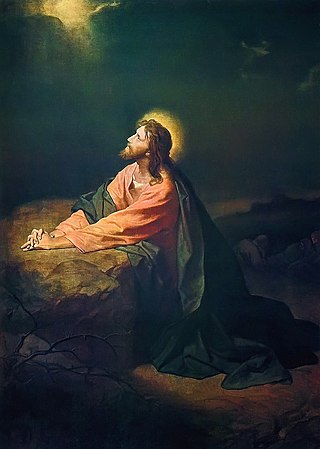
The Agony in the Garden of Gethsemane is an episode in the life of Jesus. After the Last Supper, Jesus enters a garden where he experiences great anguish and prays to be delivered from his impending death on the cross while also submitting to his Father's will. The incident is described in the Synoptic Gospels.
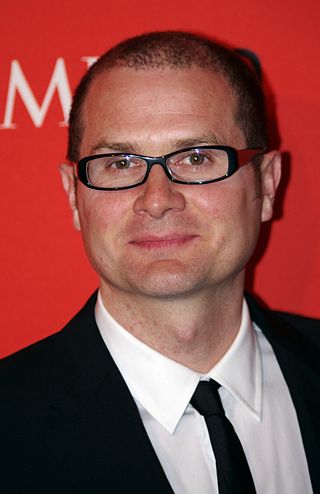
Robert Holmes Bell Jr. is an American author, speaker and former pastor. Bell founded Mars Hill Bible Church in Grandville, Michigan, and pastored it until 2012. Under his leadership, Mars Hill was one of the fastest-growing churches in America. Bell is also the author of the New York Times bestseller Love Wins and the writer and narrator of a series of spiritual short films called NOOMA. In 2011, Time named Bell on its list of the 100 Most Influential People in the World. He has since become a freelance writer and speaker appearing on various talk shows and national speaking tours on topics related to spirituality and leadership. He also hosts a popular podcast called The Robcast. In 2018, a documentary about Bell called The Heretic was released.
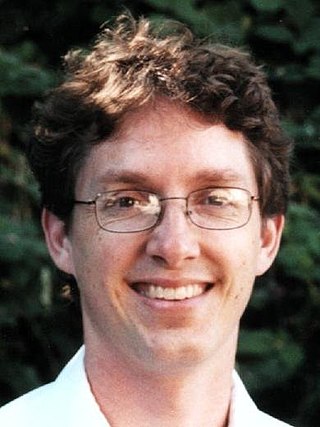
Richard Cevantis Carrier is an American atheist historian, author, and activist, whose work focuses on empiricism, atheism, and the historicity of Jesus.
The face-to-face relation is a concept in the French philosopher Emmanuel Lévinas' thought on human sociality. It means that, ethically, people are responsible to one-another in the face-to-face encounter. Specifically, Lévinas says that the human face "orders and ordains" us. It calls the subject into "giving and serving" the Other.
James J. Martin is an American Jesuit priest, writer, and editor-at-large of the Jesuit magazine America. In 2017, Pope Francis appointed Martin as a consultant to the Vatican's Secretariat for Communications. A New York Times Best Selling author, Martin's books include The Jesuit Guide to (Almost) Everything: A Spirituality for Real Life, Jesus: A Pilgrimage, and My Life With the Saints. He is a sought-after public speaker and media commentator on subjects such as the life and teachings of Jesus and Ignatian spirituality as inspired by the life and teachings of Saint Ignatius of Loyola.
Robert L. Bernasconi is Edwin Erle Sparks Professor of Philosophy at Pennsylvania State University. He is known as a reader of Martin Heidegger and Emmanuel Levinas, and for his work on the concept of race. He has also written on the history of philosophy.
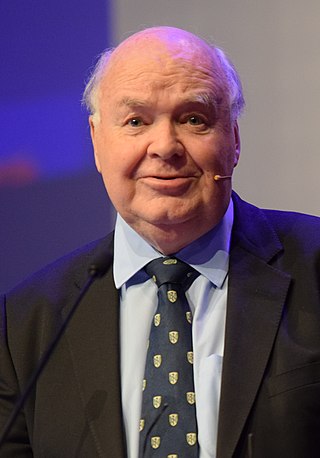
John Carson Lennox is a Northern Irish mathematician, bioethicist and Christian apologist. He has written many books on religion, ethics, the relationship between science and faith, and has had numerous public debates with atheists including Richard Dawkins and Christopher Hitchens.

Lent is a solemn religious observance in the liturgical calendar commemorating the 40 days Jesus spent fasting in the desert and enduring temptation by Satan, according to the Gospels of Matthew, Mark and Luke, before beginning his public ministry. Lent is observed in the Anglican, Eastern Orthodox, Lutheran, Methodist, Moravian, Oriental Orthodox, Persian, United Protestant and Roman Catholic traditions. Some Anabaptist, Baptist, Reformed, and nondenominational Christian churches also observe Lent, although many churches in these traditions do not.
Jewish existentialism is a category of work by Jewish authors dealing with existentialist themes and concepts, and intended to answer theological questions that are important in Judaism. The existential angst of Job is an example from the Hebrew Bible of the existentialist theme. Theodicy and post-Holocaust theology make up a large part of 20th century Jewish existentialism.
Some observers believe existentialism forms a philosophical ground for anarchism. Anarchist historian Peter Marshall claims, "there is a close link between the existentialists' stress on the individual, free choice, and moral responsibility and the main tenets of anarchism."
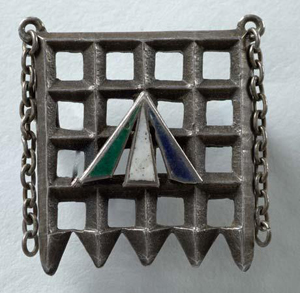
The Holloway brooch was presented by the Women's Social and Political Union (WPSU) to women who had been imprisoned at Holloway Prison for militant suffragette activity. It is also referred to as the "Portcullis badge", the "Holloway Prison brooch" and the "Victoria Cross of the Union".

Katie Edwards is an English academic, author, columnist, and broadcaster.













